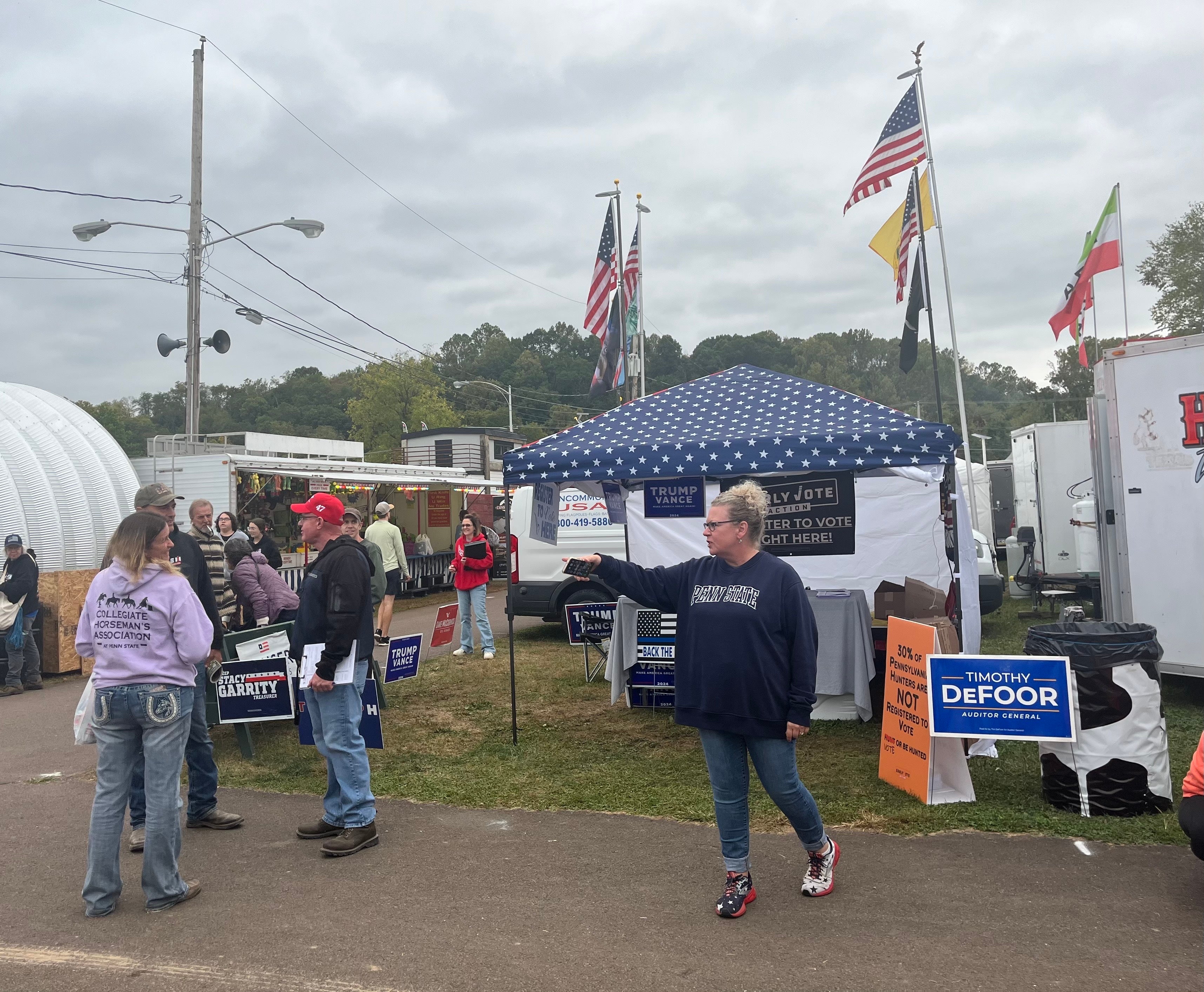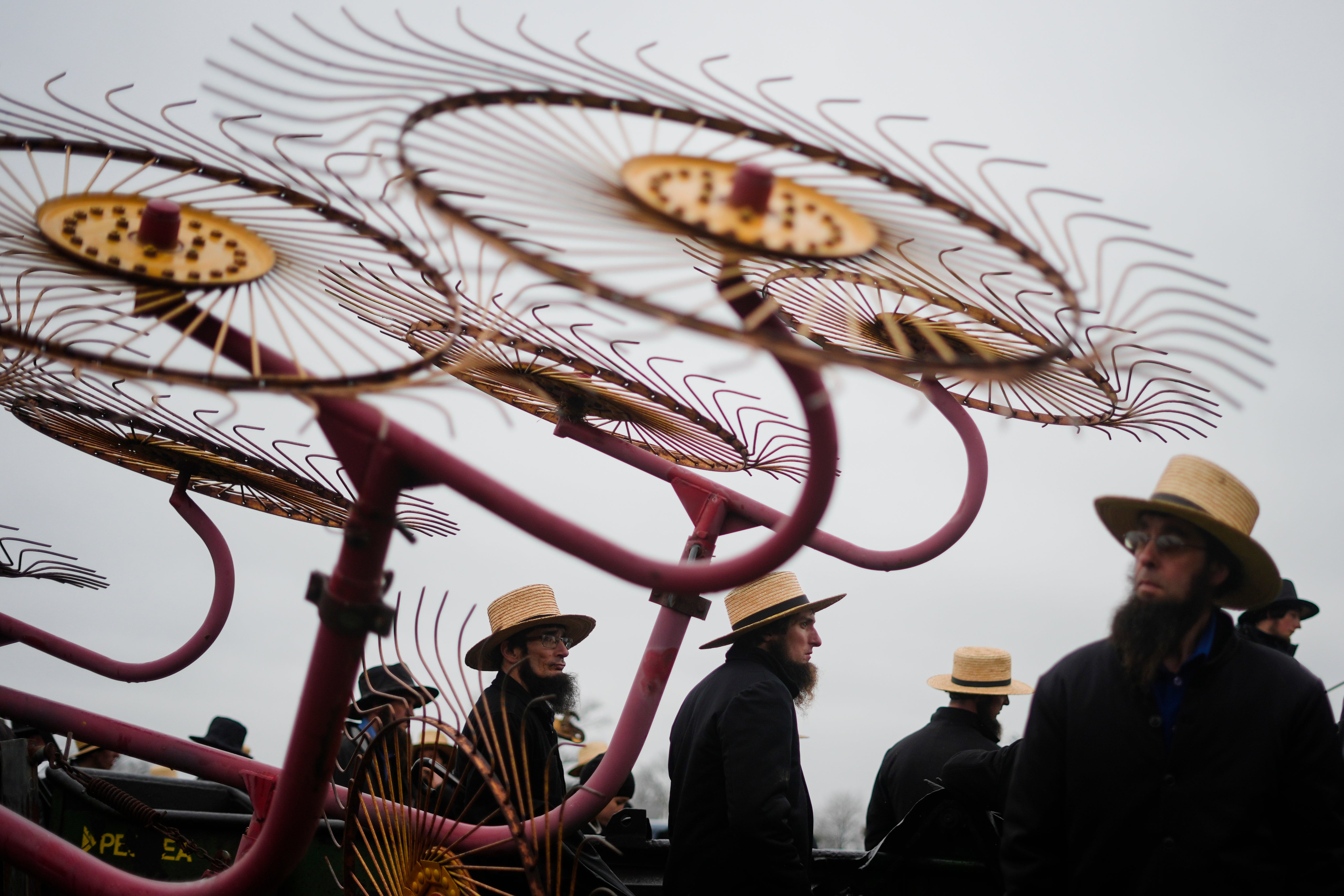‘We leave it in God’s hands’: Republicans court a skeptical Amish community in Pennsylvania
Republicans are trying to convince the Amish community to vote for Trump — but at the Bloomsburg Fair in Pennsylvania, Richard Hall discovers they face a difficult task

Your support helps us to tell the story
From reproductive rights to climate change to Big Tech, The Independent is on the ground when the story is developing. Whether it's investigating the financials of Elon Musk's pro-Trump PAC or producing our latest documentary, 'The A Word', which shines a light on the American women fighting for reproductive rights, we know how important it is to parse out the facts from the messaging.
At such a critical moment in US history, we need reporters on the ground. Your donation allows us to keep sending journalists to speak to both sides of the story.
The Independent is trusted by Americans across the entire political spectrum. And unlike many other quality news outlets, we choose not to lock Americans out of our reporting and analysis with paywalls. We believe quality journalism should be available to everyone, paid for by those who can afford it.
Your support makes all the difference.Daniel is a small business owner, he is deeply religious, and he lives in rural Pennsylvania. All of these things make him a prime target for Donald Trump’s presidential campaign.
There is one problem, however. Daniel is Amish, and the Amish do not tend to vote.
“My kingdom is not of this world,” he tells The Independent, using words attributed to Jesus in the Bible, when asked if he could ever be tempted to cast a ballot for either party. “That’s pretty much how we feel about it.”
That hasn’t stopped Republicans and MAGA activists from launching a campaign to turn the insular Amish community into Trump voters.
The community has been something of a white whale for the Republican Party for years; similar campaigns were launched in 2016 and 2020. Indeed, it is fitting, and perhaps a source of torment, that the number of Amish in Pennsylvania happens to number the exact margin by which Trump lost to Joe Biden in 2020. Some in the party believe that if his campaign could mobilize this untapped pool of 80,000 voters, it could turn the tide in his favor, and perhaps win the election.
But it will be no easy task.
The Amish — a distinct Protestant Christian group who came to North America in the 18th century to escape persecution in Europe — center almost every aspect of their lives around their faith. They reject modern technology and communication, wear traditional plain clothes, travel by horse and cart, work mostly in farming, and even speak a language unique to their community, known as Pennsylvania Dutch.
They live separately from the society around them as much as possible. Most are reluctant to take part in the elections of “the Englishers,” as they call the non-Amish.
Estimates of Amish turnout in previous elections are hard to determine, but a study of the 2020 election results found a record turnout from the community that year. Even so, the total number of votes in Lancaster County, where most Pennsylvania Amish live, did not even reach 3,000.
Whoever wins Pennsylvania is likely to become president, and both campaigns are pouring tens of millions of dollars into ads here.

But the Amish can’t be reached with television or radio ads because they don’t own televisions or radios. Most can’t be reached on the telephone for the same reasons. So Republicans are seeking them out in novel ways.
At the Bloomsburg Fair, the largest and oldest agricultural fair in Pennsylvania, a team of Trump-supporting volunteers has set up shop for the explicit purpose of reaching the Amish community, many of whom sell their farm goods here.
Kelly Stedge, a volunteer with a conservative PAC called Early Vote Action, which has a stall at the fair, believes the Amish are “fired up” this year. She cites a raid earlier this year by the Department of Agriculture on the Pennsylvania property of an Amish farmer named Amos Miller, after a listeria outbreak was traced back to his raw milk products.
“I think the Amish are seeing the outside world come into their community,” she says.
Stedge says she has interacted a lot with the Amish over the years because she ran a store in an Amish area in upstate New York. She has used that knowledge to approach the community in the right way.
“If you’re Amish, it all starts and stops with your bishop,” she says. “If the bishop says yes, I say, then we will come to you. Here’s my phone number. Go borrow a phone, call me and we’ll bring our crew down and we will register you.”
“We’ve had some conversations and I think where we’ve seen a shift in Pennsylvania,” she adds.

Other Republican-backed groups are also seeking out ways to reach the community. A Super PAC founded by Trump-supporting Republicans has been courting the Amish for the last two elections. A billboard along a highway in Lancaster County has the words: “Pray For God’s Mercy For Our Nation” emblazoned in giant letters. The message appears alongside an Amish hat with a “vote” ribbon attached.
Daniel, an Amish farmer from Herndon, Pennsylvania, stirs two giant vats of soup — one chicken noodle; the other tomato and beef — just 100 feet away from Stedge and the other volunteers. He says there is only one issue he cares about, as far as politics goes.
“Freedom of religion is important to us,” he says. “We see that as an upcoming issue.”
And if that was being encroached upon by outside forces, would he vote then? “No.”
Daniel says he’s aware of efforts by both parties to encourage the Amish to vote, but Republicans have been more insistent. He hears pieces of news about the election from his work partner, a non-Amish business farmer who also drives him places he needs to go.
“People talk to us about it in social settings. Some of us get the newspaper now and then,” he says. He believes the election ads being pumped into Pennsylvania are “biased on one side or the other — you can’t believe anything you read.”
Daniel’s opinion is shared by another Amish man working on a neighboring stall, selling caramel-covered pretzels, and who did not want to share his name.
“We Amish, we don’t really vote,” he says. “We leave it in God’s hands.”
Join our commenting forum
Join thought-provoking conversations, follow other Independent readers and see their replies
Comments